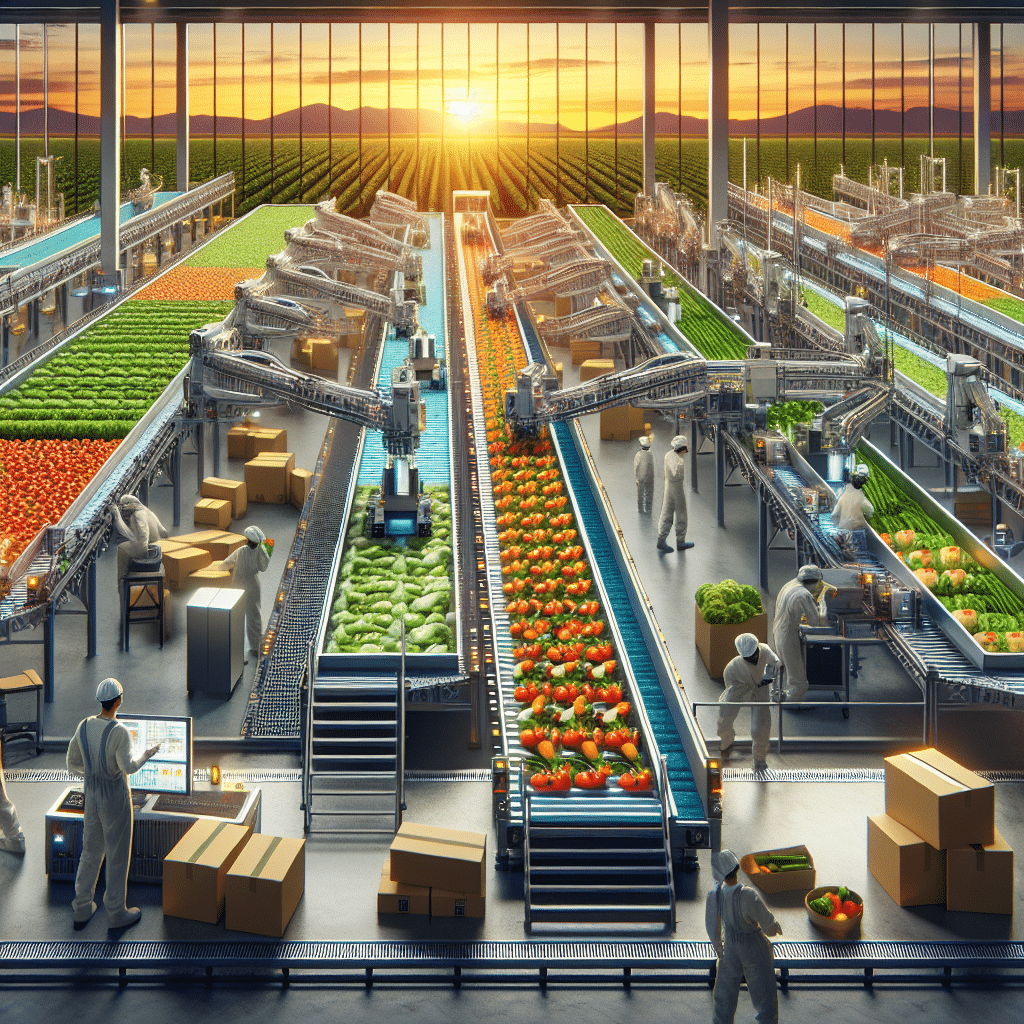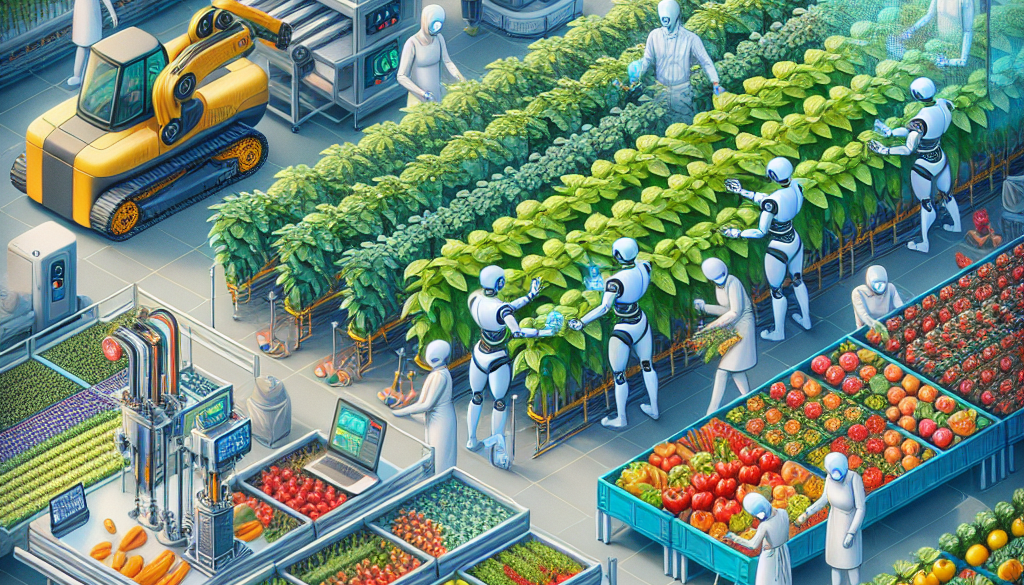How Automating Enhances Food Production and Distribution
-
Table of Contents
- Automating Food Production and Distribution: A Recipe for Efficiency and Sustainability
- The Impact of Automation on Food Production
- Revolutionizing Food Distribution with Automation
- Case Studies: Success Stories in Automation
- Challenges and Considerations
- Conclusion: Embracing the Future of Food Production and Distribution
- ETprotein: Your Partner in Nutritional Excellence
Automating Food Production and Distribution: A Recipe for Efficiency and Sustainability

The global food industry is undergoing a significant transformation, with automation playing a pivotal role in enhancing food production and distribution. The integration of advanced technologies such as robotics, artificial intelligence (AI), and the Internet of Things (IoT) is not only streamlining operations but also increasing output and reducing waste. This article delves into the ways automation is revolutionizing the food sector, offering insights supported by statistics and exploring the benefits for businesses and consumers alike.
The Impact of Automation on Food Production
Automation in food production is reshaping the way we cultivate, process, and package our food. Here are some key areas where automation is making a difference:
- Increased Efficiency: Automated systems can operate 24/7, significantly increasing the productivity of food production facilities. For instance, robotic milking systems have increased milk production by up to 15%.
- Consistency and Quality Control: Machines can perform repetitive tasks with precision, ensuring consistent product quality. Automated sorting and grading systems have been shown to reduce human error by up to 50%.
- Resource Management: Smart farming techniques use sensors and data analytics to optimize the use of water, fertilizers, and pesticides, leading to a reduction in resource consumption by up to 20%.
- Labor Shortage Solutions: Automation addresses labor shortages by taking over tasks that are difficult to fill or hazardous, such as meatpacking, which has a turnover rate as high as 100% annually in some regions.
Revolutionizing Food Distribution with Automation
Automation is also transforming the distribution side of the food industry:
- Supply Chain Optimization: Automated logistics systems can track and manage inventory in real-time, reducing stock discrepancies by up to 80%.
- Enhanced Traceability: Blockchain and IoT technologies enable better tracking of food products from farm to table, improving response times to food safety incidents by up to 30%.
- Reduced Transportation Costs: Autonomous vehicles and drones are set to reduce delivery costs by up to 40% in the next decade.
- Energy Efficiency: Automated warehouses equipped with smart energy systems can cut energy usage by up to 20%, contributing to a greener supply chain.
Case Studies: Success Stories in Automation
Several companies have successfully implemented automation in their operations:
- Vertical Farming: AeroFarms, a leading vertical farming company, uses automation to grow produce with 95% less water than traditional farming methods.
- Robotic Chefs: Spyce, a Boston-based restaurant, utilizes robotic kitchens to prepare meals, reducing wait times and ensuring consistent food quality.
- Automated Warehousing: Ocado, an online grocery retailer, operates highly automated warehouses that can process an order within five minutes, compared to the industry average of two hours.
Challenges and Considerations
While automation offers numerous benefits, there are challenges to consider:
- Initial Investment: The cost of implementing automated systems can be high, though the long-term savings often justify the expense.
- Workforce Impact: Automation can lead to job displacement, necessitating retraining programs for workers to transition into new roles.
- Technical Maintenance: Automated systems require regular maintenance and updates, which can be complex and require specialized skills.
Conclusion: Embracing the Future of Food Production and Distribution
Automation is a game-changer for the food industry, offering enhanced efficiency, quality, and sustainability. By embracing these technologies, businesses can stay competitive and meet the growing global demand for food. Consumers benefit from fresher, safer, and more accessible food products. As the industry continues to innovate, the potential for automation to improve our food systems is boundless.
ETprotein: Your Partner in Nutritional Excellence
In line with the advancements in food production and distribution, ETprotein offers a range of high-quality protein products that cater to the evolving needs of the food industry. Their organic bulk vegan proteins and L-(+)-Ergothioneine (EGT) are perfect for businesses looking to enhance their product offerings with ingredients that are not only nutritious but also produced with cutting-edge technology.
ETprotein’s commitment to non-GMO, allergen-free, and high-purity products ensures that their clients receive the best in terms of quality and safety. Whether you’re in the nutraceutical, pharmaceutical, or food and beverage industry, ETprotein has the solutions to meet your protein needs.
About ETprotein:
ETprotein, a reputable protein and L-(+)-Ergothioneine (EGT) Chinese factory manufacturer and supplier, is renowned for producing, stocking, exporting, and delivering the highest quality organic bulk vegan proteins and L-(+)-Ergothioneine. They include Organic rice protein, clear rice protein, pea protein, clear pea protein, watermelon seed protein, pumpkin seed protein, sunflower seed protein, mung bean protein, peanut protein, and L-(+)-Ergothioneine EGT Pharmaceutical grade, L-(+)-Ergothioneine EGT food grade, L-(+)-Ergothioneine EGT cosmetic grade, L-(+)-Ergothioneine EGT reference grade and L-(+)-Ergothioneine EGT standard. Their offerings, characterized by a neutral taste, non-GMO, allergen-free attributes, with L-(+)-Ergothioneine purity over 98%, 99%, cater to a diverse range of industries. They serve nutraceutical, pharmaceutical, cosmeceutical, veterinary, as well as food and beverage finished product distributors, traders, and manufacturers across Europe, USA, Canada, Australia, Thailand, Japan, Korea, Brazil, and Chile, among others.
ETprotein specialization includes exporting and delivering tailor-made protein powder and finished nutritional supplements. Their extensive product range covers sectors like Food and Beverage, Sports Nutrition, Weight Management, Dietary Supplements, Health and Wellness Products, and Infant Formula, ensuring comprehensive solutions to meet all your protein needs.
As a trusted company by leading global food and beverage brands and Fortune 500 companies, ETprotein reinforces China’s reputation in the global arena. For more information or to sample their products, please contact them and email sales(at)ETprotein.com today.














